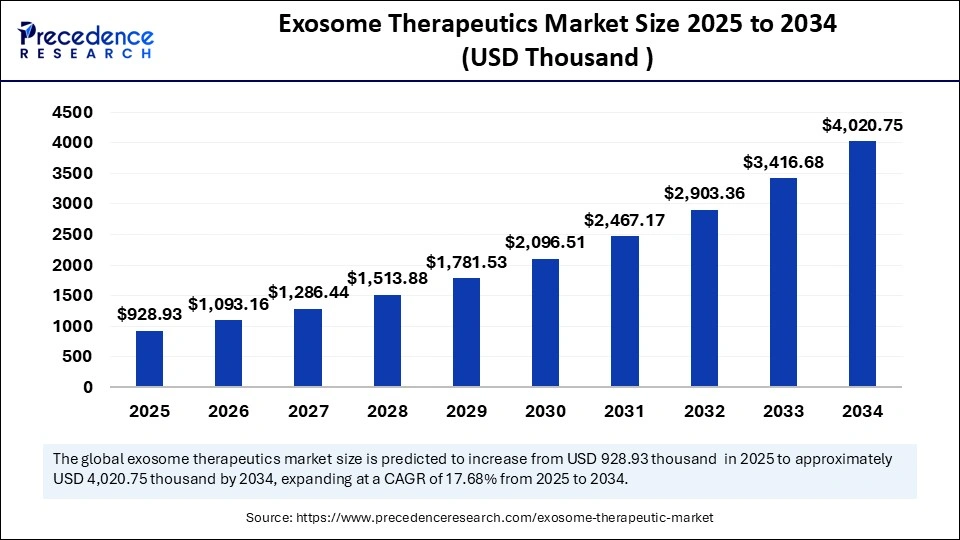 Market Overview
Market OverviewExosomes are nanoscale extracellular vesicles secreted by various cell types, including stem cells, and have garnered significant attention for their potential in drug delivery, regenerative medicine, and diagnostics. Their ability to transfer proteins, lipids, and RNA makes them ideal candidates for targeted therapies, particularly in oncology, neurology, and autoimmune diseases.
Key Market Highlights
-
Market Size and Growth: The exosome therapeutics market is experiencing robust growth, with projections indicating substantial increases in market size over the next decade.
-
Dominant Regions: North America held a significant market share in 2024, attributed to substantial investments in research and development and a strong emphasis on sustainable practices. Asia Pacific is expected to witness the fastest growth during the forecast period, driven by advancements in digital infrastructure and increasing adoption of AI technologies.
-
Market Segmentation: The market is segmented based on components, exosome sources, therapeutic applications, delivery methods, and regions. Each segment exhibits unique growth patterns and adoption rates across different industries.
Rising Demand in the Exosome Therapeutics Market
The demand for exosome-based therapies is escalating due to several factors:
-
Targeted Drug Delivery: Exosomes can encapsulate therapeutic agents and deliver them precisely to target cells, minimizing off-target effects and enhancing treatment efficacy.
-
Regenerative Medicine: Exosomes derived from stem cells have shown promise in tissue repair and regeneration, offering potential treatments for conditions like myocardial infarction and neurodegenerative diseases.
-
Cancer Therapy: Exosomes play a role in modulating the tumor microenvironment and can be engineered to deliver anticancer agents, making them valuable in oncology.
-
Diagnostic Applications: Exosomes serve as biomarkers for various diseases, enabling non-invasive diagnostics through bodily fluids.
Market Growth Drivers
Several factors contribute to the growth of the exosome therapeutics market:
-
Technological Advancements: Innovations in exosome isolation, purification, and engineering techniques have improved the scalability and reproducibility of exosome-based therapies.
-
Regulatory Support: Regulatory agencies are providing clearer guidelines for the development and approval of exosome-based therapeutics, fostering industry growth.
-
Investment in R&D: Increased funding in research and development accelerates the discovery of new applications and improves product yields.
-
Consumer Preferences: Rising consumer demand for natural and plant-based products fuels the growth of exosome-based industries.
Restraints in the Exosome Therapeutics Market
Despite the promising growth, the exosome therapeutics market faces several challenges:
-
High Production Costs: The cultivation and processing of exosomes can be expensive, limiting their widespread adoption.
-
Technical Challenges: Issues related to scalability, harvesting efficiency, and product consistency need to be addressed.
-
Market Competition: The presence of established alternatives in various applications poses competitive pressure on exosome-based products.
-
Regulatory Hurdles: Navigating through complex regulatory frameworks can delay product development and market entry.
Opportunities in the Exosome Therapeutics Market
The exosome therapeutics market presents several opportunities:
-
Personalized Medicine: Exosomes can be engineered to deliver specific therapeutic agents, enabling personalized treatment approaches.
-
Combination Therapies: Combining exosome-based therapies with existing treatments can enhance therapeutic outcomes.
-
Global Expansion: Emerging markets offer growth opportunities for exosome-based therapeutics, driven by increasing healthcare investments.
AI & Innovation in the Exosome Therapeutics Market
Artificial Intelligence (AI) is playing a pivotal role in the innovation of exosome therapeutics:
-
Data Analysis: AI algorithms analyze large datasets to optimize exosome production processes and identify potential therapeutic targets.
-
Predictive Modeling: Machine learning models predict the behavior of exosomes in various biological environments, aiding in the design of effective therapies.
-
Automation: AI-driven automation enhances the efficiency of exosome isolation and characterization, reducing human error and increasing throughput.
Future Trends in the Exosome Therapeutics Market
The exosome therapeutics market is expected to witness several trends:
-
Integration with Regenerative Medicine: Exosome-based therapies are increasingly being integrated into regenerative medicine approaches for tissue repair and healing.
-
Advancements in Engineering: Ongoing research focuses on engineering exosomes to enhance their stability, targeting capabilities, and therapeutic payload capacity.
-
Expansion into New Therapeutic Areas: Beyond oncology and neurology, exosome-based therapies are being explored for applications in cardiovascular diseases, autoimmune disorders, and infectious diseases.
Regional Insights
-
North America: Dominates the market with a significant share, driven by technological advancements and strong research capabilities.
-
Asia Pacific: Expected to experience the fastest growth during the forecast period, fueled by increasing industrialization and adoption of sustainable practices.
-
Europe: Focuses on regulatory frameworks and sustainability, promoting the use of exosome-based therapeutics in various applications.
-
Latin America and Middle East & Africa: Emerging markets with growing interest in exosome-based solutions for energy and agriculture.
Exosome Therapeutics Market Companies
- EV Therapeutics
- StemXO Therapeutics
- Codiak BioSciences
- ExoCoBio
- ILIAS Biologics
- Regeneus
- Innovex Therapeutics
- Brexogen
- Organicell Regenerative Medicine
- Direct Biologics
- Exostemtech
- OmniSpirant
- ShiftBio Inc.
- Aruna Bio
- Kimera Labs
Recent Developments
- In September 2025, RION, a commercial and clinical-stage regenerative medicine company, announced a collaboration with Lonza, one of the world’s largest contract development and manufacturing organizations (CDMOs), to provide cGMP manufacturing and technical support for commercial-scale production of its Purified Exosome Product (PEP) drug substance for late-phase clinical supply and beyond.
- In September 2025, Coya Therapeutics, Inc., a clinical-stage biotechnology company focused on developing biologics that enhance regulatory T cell (Treg) function in patients with neurodegenerative disorders, announced the launch of the ALSTARS Trial, a Phase 2, randomized, multi-center, double-blind, placebo-controlled study to evaluate the efficacy and safety of COYA 302 for the treatment of ALS.
Get Free sample Link @ https://www.precedenceresearch.com/sample/6932
- Bioinformatics-as-a-Service (BaaS) Market Size to Reach USD 14.56 Billion by 2034 - October 8, 2025
- Exosome Therapeutics Market Size to Reach USD 4,020.75 Thousand by 2034 - October 7, 2025
- Microalgae Biotechnology Market Size, Report by 2034 - October 7, 2025
